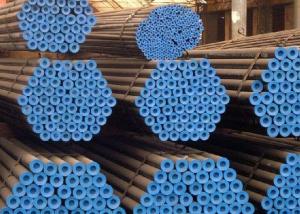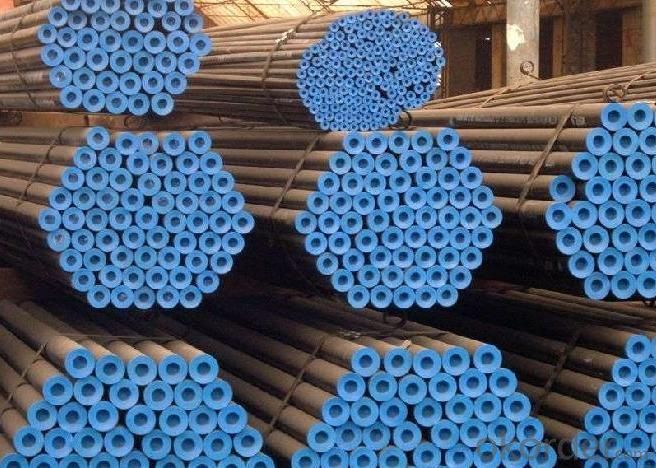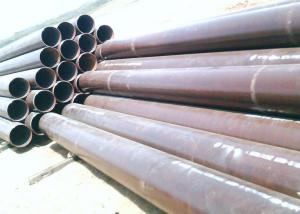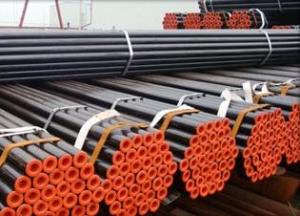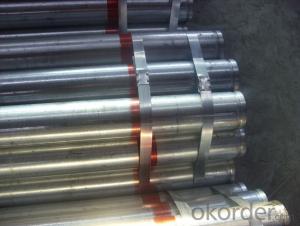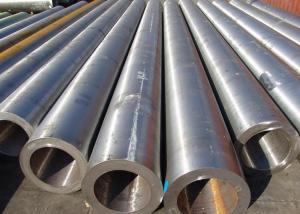Tube For Hydraulic Pillar Service Grade 35# Seamless Steel Pipe
- Loading Port:
- China Main Port
- Payment Terms:
- TT or LC
- Min Order Qty:
- Negotiable m.t.
- Supply Capability:
- 5000 Tons Per Month m.t./month
OKorder Service Pledge
OKorder Financial Service
You Might Also Like
Seamless Steel pipes
Standard of Tube For Hydraulic Pillar Service Grade 35# Seamless Steel Pipe
API SPEC 5L, API SPEC 5CT, ASTM A53, GB/T9711.1
Description of Tube For Hydraulic Pillar Service Grade 35# Seamless Steel Pipe
Product name | ASTM A106 Gr.B /API 5LGr.B Seamless steel pipe |
Outside Diameter | 10.3-1020mm |
Wall Thickness | 4-90mm |
Standard | DIN ASTM API GB |
Material | 10# 20# 45# Q235 Q195 Q345 |
Origin | China |
Certificate | API5L ISO9000 API 5CT |
Technique | hot rolled |
application | use for oil well, boilers, precision machines, petro-chemical, ship, structure pipe, building, fluid tubes, line pipe etc |
Testing | we have professional testing equipments such as ultrasonic testing machine, eddy current testing machine, mechanics testing machine to make sure high quality |
Tolerance: | WT TOLERANCE-5%+5% |
Min Order | 5 TON |
Usage | Petroleum and natural gas industry, chemical industry, electric industry, flammable and non-flammable liquid transportation and steel construction, drainage project and city construction etc. |
Package | in bulk , in bundle, standard seaworthy package |
Length | 1-12M |
Delivery time | 15-20 days after received the advanced payment |
Packing | Black paint or varnish ,plastic caps with the both ends |
CHEMICAL COMPOSITION (%)
C (Max) | Mn(Max) | Si(Max) | S(Max) | P(Max) |
0.22 | 1.6 | 0.5 | 0.035 | 0.035 |
MECHANICAL PROPERTIES
Elongation(Min) | Y.S (Min.) | UTS (Min.) |
≥15 | 470 N/MM2 | 580 N/MM2 |
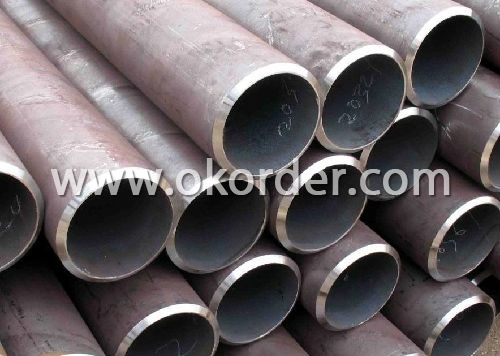
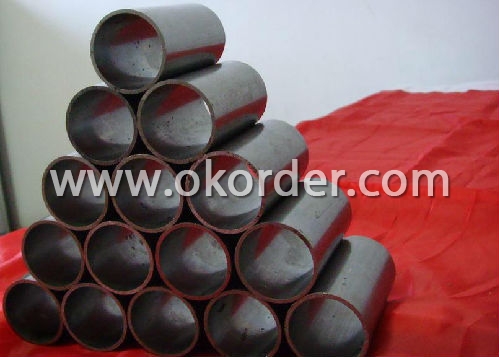
- Q: How do steel pipes perform in corrosive environments?
- Steel pipes perform well in corrosive environments due to their inherent resistance to corrosion. Steel is a durable and strong material that can withstand exposure to various corrosive elements such as moisture, chemicals, and saltwater. Additionally, steel pipes can be further protected through coatings or linings to enhance their resistance to corrosion, making them a reliable choice for applications in corrosive environments.
- Q: What are the different methods of coating steel pipes for insulation?
- There are several methods of coating steel pipes for insulation, including applying a layer of thermal insulation material, such as foam or fiberglass, directly onto the surface of the pipe, using a heat shrink sleeve or tape to wrap around the pipe, or applying a liquid coating that hardens and provides insulation.
- Q: What is the difference between black and galvanized steel pipes?
- The main difference between black and galvanized steel pipes is the protective coating. Black steel pipes are untreated and prone to rusting, while galvanized steel pipes are coated with a layer of zinc to prevent corrosion. This zinc coating makes galvanized pipes more durable and suitable for outdoor applications, such as plumbing or fencing, whereas black steel pipes are commonly used for indoor plumbing or gas lines.
- Q: What are the dimensions of a standard steel pipe?
- The dimensions of a standard steel pipe can vary, but commonly, they range from 1/8 inch to 72 inches in diameter and have a standard length of 21 feet.
- Q: What are the different types of steel pipe supports for high-temperature applications?
- Some different types of steel pipe supports for high-temperature applications include hangers, clamps, brackets, and anchors. These supports are designed to withstand the elevated temperatures and provide stability and proper alignment to the piping system.
- Q: How are steel pipes used in the pharmaceutical industry?
- Steel pipes are commonly used in the pharmaceutical industry for various purposes such as transporting fluids, gases, and chemicals, as well as providing structural support for equipment and machinery. They are utilized in pharmaceutical manufacturing processes, including the transfer of raw materials, disinfection, and sterilization procedures, and the distribution of pharmaceutical products. Steel pipes ensure the safe and hygienic transfer of substances, maintaining the integrity and quality of pharmaceutical products throughout the production and distribution chain.
- Q: What is the maximum length of a steel pipe?
- The maximum length of a steel pipe can vary depending on various factors such as the manufacturing process, transportation constraints, and practical limitations. However, steel pipes can typically be manufactured and transported in lengths ranging from a few meters to several hundred meters.
- Q: Are steel pipes suitable for conveying fluids?
- Yes, steel pipes are suitable for conveying fluids. They are widely used in various industries for transporting liquids and gases due to their high strength, durability, and resistance to corrosion.
- Q: How do you measure the diameter of a steel pipe?
- To measure the diameter of a steel pipe, you can use a caliper or a measuring tape. Place the caliper jaws or measuring tape around the widest part of the pipe, ensuring it is perpendicular to the pipe's axis. Take the reading displayed on the caliper or measure the distance between the two points on the measuring tape. This measurement will provide you with the diameter of the steel pipe.
- Q: There are multiple welded galvanized steel pipe outer diameter 108mm wall thickness 4mm length of 6 meters
- Formula for calculating weight of welded steel pipe:Kg/m= (outside diameter mm-, wall thickness mm) * wall thickness mm*0.02466= (108-4) *4*0.02466=10.26 kg / MBecause of galvanizing, the weight is heavier than that of ordinary welded pipe 3%~6%.Therefore, the length of 6 meters galvanized steel pipe weighs about 10.26*6*1.06=65 kilograms
1. Manufacturer Overview
| Location | Henan, China |
| Year Established | 2001 |
| Annual Output Value | 800,000Tons |
| Main Markets | Europe and the United States; Canada; India; South etc. |
| Company Certifications | API 5L; API 5CT; GB/T19001-2000 idt ISO9001:2000 |
2. Manufacturer Certificates
| a) Certification Name | |
| Range | |
| Reference | |
| Validity Period |
3. Manufacturer Capability
| a) Trade Capacity | |
| Nearest Port | Qingdao; Lianyungang |
| Export Percentage | 50% - 60% |
| No.of Employees in Trade Department | 1000-1100 People |
| Language Spoken: | English; Chinese; Spanish |
| b) Factory Information | |
| Factory Size: | Above 423,000 square meters |
| No. of Production Lines | Above 10 |
| Contract Manufacturing | OEM Service Offered; Design Service Offered |
| Product Price Range | Average |
Send your message to us
Tube For Hydraulic Pillar Service Grade 35# Seamless Steel Pipe
- Loading Port:
- China Main Port
- Payment Terms:
- TT or LC
- Min Order Qty:
- Negotiable m.t.
- Supply Capability:
- 5000 Tons Per Month m.t./month
OKorder Service Pledge
OKorder Financial Service
Similar products
Hot products
Hot Searches
Related keywords
